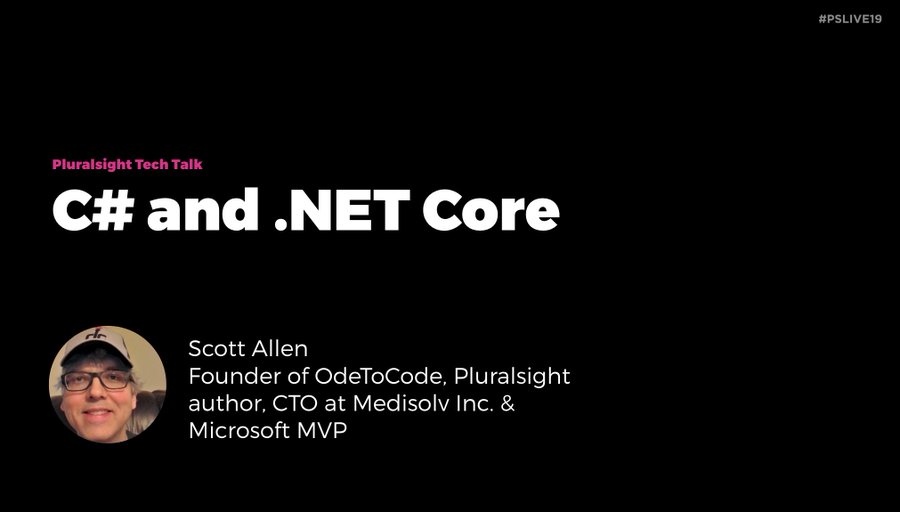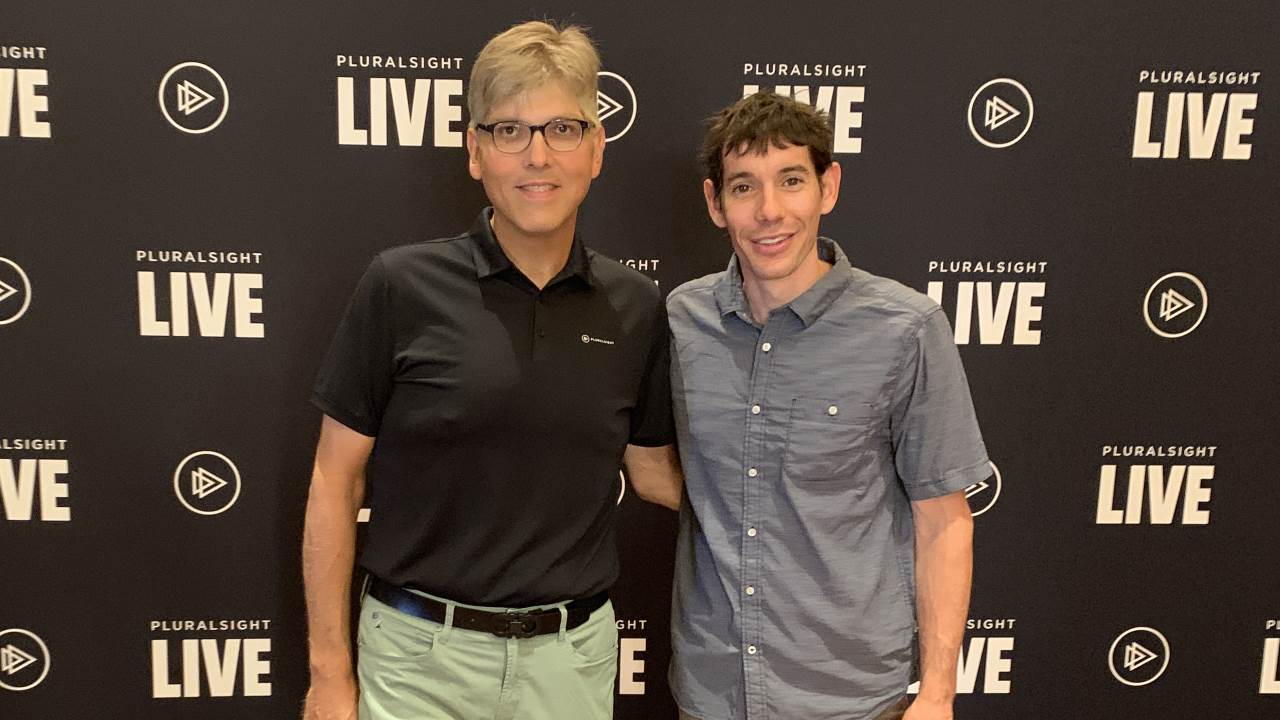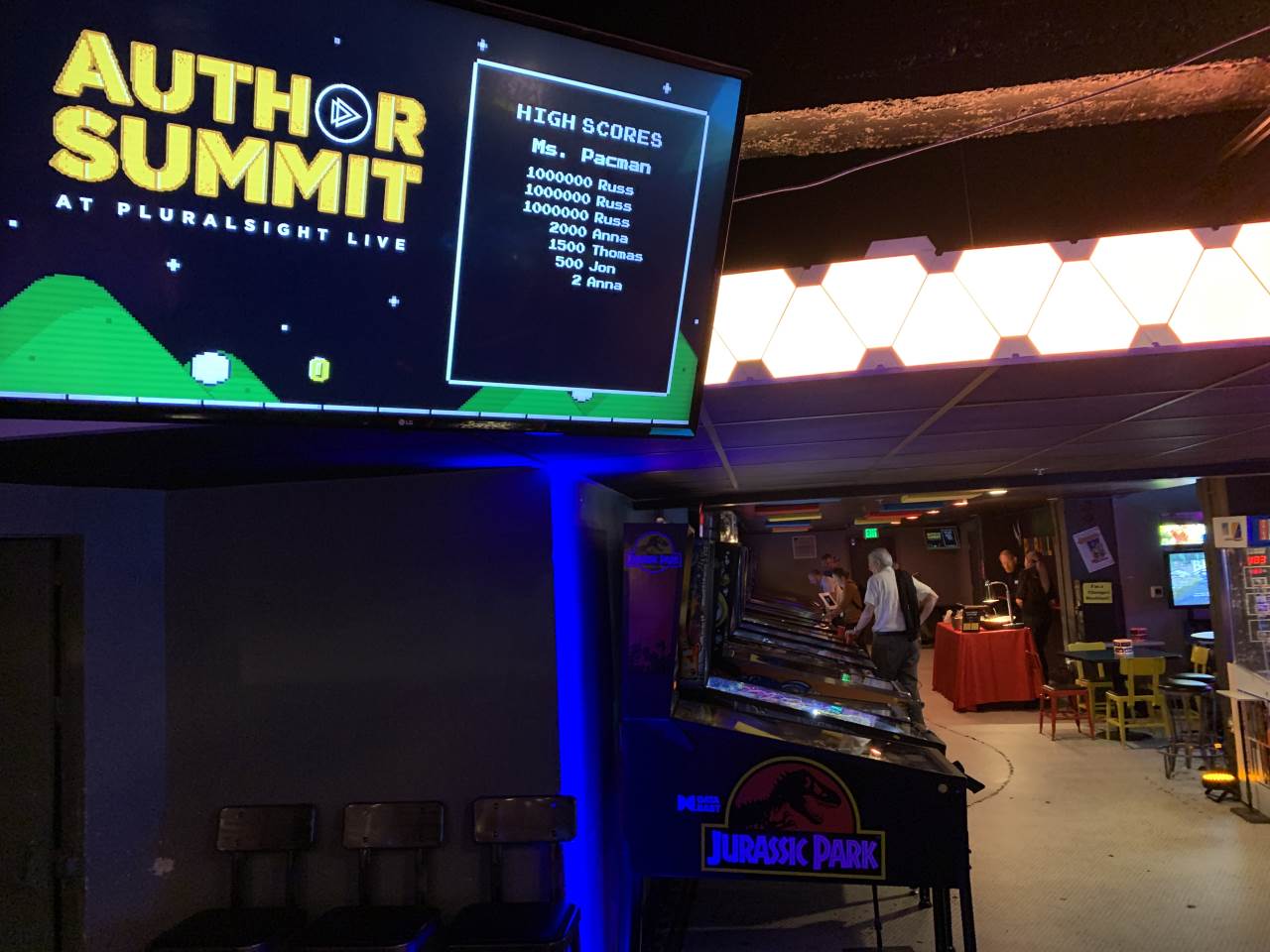Here are some questions, with answers, from my interview session at Pluralsight LIVE!.
I was working for a Microsoft shop when Microsoft first released .NET. At the time I was writing COM components in C++. I read about .NET in MSDN magazine, which is defunct now, sadly, but I wanted to be the first person at my company to understand .NET and be able to lead the charge in a new direction.

The .NET ecosystem has always been a good ecosystem, although there were some dark days when Silverlight died, and Sinofsky announced the Win8 development stack, which made no mentions of .NET. I'm happy the ecosystem is back and healthier than ever. Teams inside Microsoft embrace .NET Core, and we are seeing a .NET renaissance.
I’ve stayed here because the ecosystem is familiar, yes, but also exciting again. .NET is also not as fragmented and disjointed like other ecosystems, and I still think .NET has the best tools and can be the most productive.
I hope development teams embrace non-nullable reference types. I’ve been using non-nullable references in a new project, and I’m seeing why developers rave about languages, like F#, where you don’t have to spend as much time reasoning about nulls. You might have to work a bit harder at first, but there’s a certain amount of complexity that disappears from your thinking, and from the code itself.
The reoccurring hurdle in my career has been data. If only we could write software without worrying about data! I’ve always worked on projects where even getting to the data is a challenge. Real data is always dirty and messy, so one tough job is cleaning up data for the software to work.
Another reoccurring hurdle has been mapping data. I've spent most of my time in the mortgage industry and the healthcare industry, and in both places there is always difficulty in moving data from one system to another. You need to change identifiers and lookup codes. You also need to change the shape of the data, sometimes matching two pieces together, sometimes splitting one piece apart.
Another hurdle is the volume of data, especially these days. How do you move large datasets from one source to another? I feel there is an iron triangle in the extract, load, and transform operations. You can be flexible. You can be fast. You can be cheap. But, you can only pick two of those three qualities.

I don't think I've ever overcome the data hurdle, so to speak. Software is about tradeoffs. For the complex problems in real-world software you'll never find perfect solutions. What you hope to find is a solution that removes some of the problems you want to avoid, and gives you a set of problems you are willing to deal with.
A good example is picking a database technology. Do you need flexibility in how to evolve the schema? Pick a document database, but understand the problems you'll face with reporting and aggregations. Does the business require strict consistency? Pick a relational database, but understand the challenges you'll face in scalability and object-relational mapping. Want the best of both worlds? Send your writes to a relational database and query from a document database, but understand the new set of problems stemming from the additional complexity of maintaining two data stores. Software is all about tradeoffs!
I need to be hands on. I’ll give you a recent example where I was gearing up to learn Apache Spark. I read quite a bit about Spark at high level. I watched some videos. I browsed some blog posts. I understood the types of problems Spark is trying to solve and how Spark relates to other technologies like Hadoop. But, I learned more about Spark in 30 minutes after I installed the software locally and worked through some examples in the Spark shell, which is like a REPL for Spark.
By the way, REPLs are always avfantastic tool for learning and exploring a technology or language.

Have patience and be persistent! Something I’ve realized over the years is how much I continue to learn about technologies I think I already know as time passes. I believe the learning happens because my perspective changes over time and I can see the technology in a different light.
An example would be delegates in C#. I found delegates to be confusing and difficult to learn when I started with C#, and based on what I hear from my students, this is true for nearly everyone. Over the years I learned about other languages, like Python and Ruby and JavaScript, where functions are first class. I began to see past the complicated C# syntax for delegates and understand some of the simple functional concepts that form the basis of delegates. You could say my experience gave me a brighter light to shine on the subject of delegates so I could see them clearly for what they are, and what they are capable of.
If you feel like you are stuck on a topic, try approaching the topic from a different direction. Try to solve a different problem with the technology, or try a different technology with the same problem. The range of experiences you can gather will help you gain the insights you need, but experience takes time. Learning is a marathon race, and not a sprint.
Without a doubt the best change is the move towards ethical computing and ethical software. I feel fortunate and privileged to have grown up in the golden age of computing, where every day, and every month, and every year computers grew more powerful and made positive impacts in my life. For example, if I think back to the first time I came here to Salt Lake city, it was in the days before the iPhone. I had to rent a car, and look at a map to plan my drive from the airport. I spent lots of time and money just managing the logistics of the trip.
Yesterday, I flew into the airport with no preparation and used my phone at baggage claim to book a $15 ride to the hotel. Technology boosted my productivity all through the trip, and removed a lot of stress.

I worry that in the future I might have grandkids and they won't see computers as powerful and fun. I worry they might see computers as tools of oppression, or depression. I believe it was Scott Galloway that said something like social media is to mental health what smoking was to the physical health of our parent's generation. In other words, when I was growing up,I remember seeing the magazine ads with the Marlboro man and marketing copy about all the pleasures of smoking. Smoking was cool and doctor approved! Most people today understand the physical tolls of smoking on the respiratory and cardiovascular systems. Smoke is a poison. I genuinely worry that future generations will look back at social media's impact on mental health in the same light, and maybe even the Internet in general. The unlimited content, the unlimited conflict, and the AI algorithms designed to feed us dopamine boosts to keep us hooked – these are all pushing into dangerous boundaries.
I still think Angular 1.5 was the best version of Angular. Yes, Angular in the v1 days had quirks, and a strange vocabulary, and was not the easiest framework to learn. But, Angular was an amazingly productive framework once you got over the initial hurdles.
Speaking of mental health, I walked away from front-end development about 20 months ago. I feel much more relaxed these days.
If you are in front end development, or the JavaScript ecosystem in general, the one thing I would say is to make sure you learn the timeless skills. Yes, to do the best work you’ll need to know your framework, your language, and the operating environment. You'll need to know it all cold. But, there are diminishing returns to this learning path because the technologies here are ephemeral and what you'll need in 5 years will be different.
Timeless skills would be skills like designing a user experience, or writing clean code as a craft, or leading a software team. Those skills are still valuable in 5, 10, 20 years.
Azure DevOps amazes me. I have always been someone who promotes and works toward good configuration management practices. I once wrote a custom build engine so the company could have a repeatable build and release process. We could check-in source code to start a build, and have the build package the software for deployment. This was 18 years ago. That system was a lot of work, but a lot of fun to build and gave us many advantages.
Eventually Microsoft’s Team Foundation Server replaced the system, but TFS was also a lot of work to install, configure, and maintain. DevOps makes it so easy to setup a source code repository, define a build, define a release, and track work items. I don’t have to spend time on infrastructure problems or worry about upgrades.

I think we will see more serverless platforms, or, more of the existing platforms move to a serverless model. The word serverless is thrown around too much as a marketing term, though, so let me be more specific. I think we will continue to move to a model in the cloud where we pay for what we use instead of paying for what we provision. That’s what serverless means to me.
I want to tell Azure here is my code, and here is my data. Now, if I have 1,000 customer requests tomorrow bill me $1 for the day. And, if there are 10,000 requests the day after bill me $10 for the day. Then, if there are one million requests the next day, bill me $100. I don’t want to define what type of service plan I need and then setup and configure auto-scale rules. I don’t want to pay to reserve the virtual hardware for 2 million requests and then only have 1 customer show up. All this AI power in the cloud should give me what I need just in time.
I’ve never been particularly good at predicting software futures, but I do think the pressures of ethical computing will continue to grow. As software developers we are accustomed to attending family reunions and trying to avoid those relatives who want us to fix their PC, or hook up their printer, or help them download pictures from their flip phone.
I’m worried we are going to start avoiding those relatives who ask us harder questions. Like, why did bad software allowed their identity to be stolen, or my car to avoid an emission test, or crash an airplane, or discriminate against individuals. I think we need to start using tools like the Ethical operating system, which is a toolkit for evaluating risk zones to help you think about the long term ethical impacts of software.
I mentioned this before, but the first truth is that a career in software development is a marathon, not a sprint. You want to make sure you are continually improving and at a steady pace. It will take some time, but you can be as great as you will yourself to be.
The second truth I wish I knew when I started is that empathy is crucial for software development. If you are a developer who builds a UI, you need to have empathy for the users of your user interface. If you are a developer building a web service, you have to have empathy for the users of your API. When you are writing any line of code, you need to have empathy for the other developers who come along to maintain or change your code. You also need empathy for the ops team. How can you make your software easier to deploy? How can you make your software easier to monitor and troubleshoot when the software is in production?
I can’t overemphasize empathy, and I believe empathy is a skill you can improve. Get to know the people who use your code, who use your software, who operate your software. Get out of your comfort zone and try to experience other people’s viewpoints and opinions.
And finally, hone your ability to do root cause analysis. This will help you not only in software development, but also in your personal relationships, your business relationships, your health, your leadership abilities, and in so many places in life. Learn how to ask the 5 whys. The 5 whys are a good process you can use to start practicing root cause analysis, and you can practice on everyday problems you face in life.
I've been working with Apache Spark recently, and i find it absolutely fascinating. I think the ability to apply functional programming techniques to distributed computing and large datasets is fascinating and exciting. For .NET developers, think of it as LINQ for big data. Maybe I'll be able to put together a course for .NET developers who need to use Spark.

 OdeToCode by K. Scott Allen
OdeToCode by K. Scott Allen